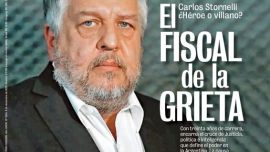A corruption accusation against Sergio Berni, the outspoken and controversial security minister of Buenos Aires Province, helps put into perspective the complex socio-political landscape that presents itself as the 2023 campaign gets going.
Berni, who’s been a strong critic of President Alberto Fernández and even previously announced he had left the Kirchnerite space, has always been an oddball within the juxtaposition that is the ruling Frente de Todos coalition, even though he’s always truly fit in. Now, with Cristina Fernández de Kirchner questioning the security situation in the always dangerous conurbano bonaerense (i.e. the poorer suburbs encircling the Buenos Aires Metropolitan Area) and a tough report on supposed illicit enrichment, Berni is once again walking on the edge of a tightrope, a situation he knows all too well and has managed to outlast thus far. The “Berni affair” also helps explain the constant infighting within the opposition coalition, allowing libertarian economist Javier Miliei to dream of chiselling off hardliners from Juntos por el Cambio.
Another controversial character, journalist Jorge Lanata, put out a damning report against Berni alleging the official came into public office in 2003 with a mere US$88,000 to his name, a figure that has grown to more than US$3 million today. According to Lanata’s show PPT, Berni and wife Agustina Prospato — who is a national deputy — own 16 properties in Buneos Aires City, three lots with touristic rentals in El Chaltén (Santa Cruz Province), two trusts in Escobar municipality, three apartments and a million-dollar mansion facing the Nahuel Huapí lake in Bariloche (Río Negro Province). Furthermore, the Bernis own a boat, a motorcycle, two vehicles, and cash deposits. The report suggests that Berni’s public net worth presentations are riddled with inconsistencies including undeclared properties, suspicious coincidences in the value of different assets, some of which come and go from his declared patrimony through the years, and even last second amendments to the documents as the show was about to go on air. From 2019 to 2022, the Bernis saw their net worth grow 110 percent in dollars from US$1.45 million to US$3.041 million as the pandemic and successive economic debacle hit Argentina and the world.
Berni denied the accusation, calling it part of a political operation against him launched from the media. Claiming to have been previously cleared of suspicion by a Supreme Court investigative body, the security minister — who is also a surgeon, a lawyer, karate black belt, tactical diver, and part of the Armed Forces — said his assets are fully declared and publicly available, accusing certain political sectors of jumpstarting the 2023 campaign. “This is the same thing they did to me in 2015,” he said according to Perfil, “[and] I’m going to do the exact same thing: I’m going to the Judiciary so they can analyse my patrimony. Unlike others, all of it is in plain sight.” As he usually does, he offered his resignation to Governor Axel Kicillof, taking a little jab at the president on the way for good luck. “The day I have to leave, I’ll walk away. I’m not tied down as I didn’t ask to be here [as Minister] or to remain here. I’m not [former Economy Minister] Martín Guzmán, Axel Kicillof isn’t Alberto Fernández,” he said.
Rumours regarding his impending exit from Kicillof’s Cabinet spread like a wildfire. But the provincial strongman has been in the crosshairs several times before. In early October, a man was killed after the Buenos Aires Province Police went on the offensive as football fans gathered around a stadium in La Plata to watch a match between Gimnasia and Boca Juniors. Berni said he wasn’t responsible, despite the event occurring under his jurisdiction. More recently, Fernández de Kirchner told a crowd it was time to put the country's security forces to work serving the people and that they should respond to civil authorities, in what was seen as a direct blow to Berni’s authority.
Interestingly, the controversial minister has managed to remain in power and in close proximity to Kirchnerite leaders. A few years ago he had a public falling out with Máximo Kirchner, with reports of a physical brawl later denied by Berni, and earlier this year he claimed to have “left” the Kirchnerites in order to launch his own space. Yet Berni has remained loyal to the Kirchner family for over 20 years, beginning his political career with Néstor’s sister Alicia — currently Santa Cruz Province governor — to eventually become security secretary in Cristina’s second term in office. He was the first person on the scene of the crime of late AMIA Special Prosecutor Alberto Nisman. In Kicillof’s government, Berni became the symbol of taking a hard-line approach to deal with insecurity, allowing a traditionally leftist government to appeal to certain values more commonly associated with the right. At the same time, his showmanship — Berni loves to show up to publicly televised conflicts on motorcycles or helicopters, directly engaging protesters and others, and is a frequent commentator on political TV — allows him to take the spotlight, sometimes positioning the Kicillof government carefully and other times taking the heat, without it spilling over to Kirchnerism.
Whether Berni remains in office or not, he is a symptom of an eclectic Argentine political system in which PRO party chair Patricia Bullrich is one of the prime contenders for the presidency next year. A former national security minister, she also espouses the hard-line approach, something that differentiates her from the “doves” in her own political space, especially Buenos Aires City Mayor Horacio Rodríguez Larreta. In their attempt to remain electorally palatable, both coalitions have become eclectic, appealing to as large as slather of the electorate as possible. This means internal contradictions have emerged – in the same way that Berni’s tough guy approach clashes with Kirchnerism’s traditional approach of upholding the rights of the oppressed (even if they are criminals), Bullrich’s hawkish anti-Kirchnerism contrasts with Rodríguez Larreta’s intention to create a 70 percent socio-political supermajority through dialogue.
Argentina’s major political coalitions were born out of electoral necessity, first to oust Cristina with Mauricio Macri leading the way in 2015, and then to return to power with the Fernández-Fernández ticket in 2019. In both cases the leaders failed at governing and fuelled further polarisation. The risk of a dual schism in both coalitions could lead to a fully fragmented field in 2023, giving outsiders like Milei a chance of making it to the run-off. It’s probably not in either group’s interest to split before the election, but they will bend their political conglomerates to the limit.



















Comments